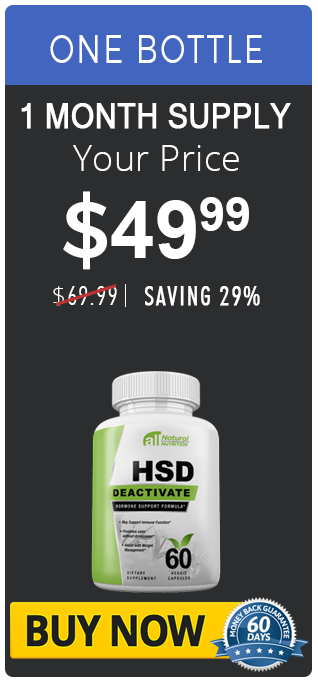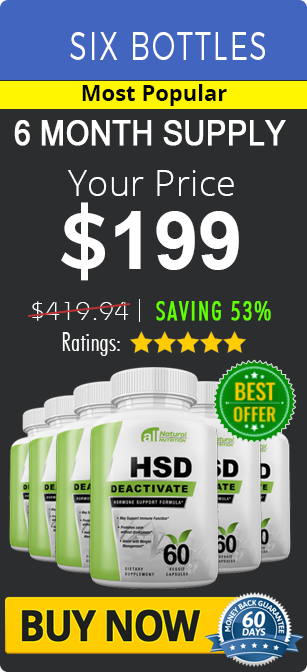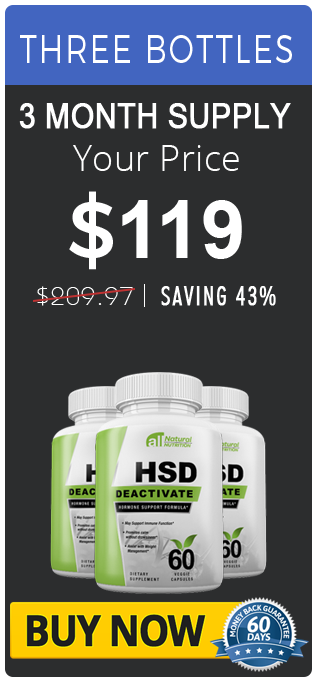Burn Stress Belly Fat Faster With
Deactivate
Order Deactivate Today and Stop Fat Storage For a Steep Discount Off The Retail Price
(Special New Customer Introductory Pricing)
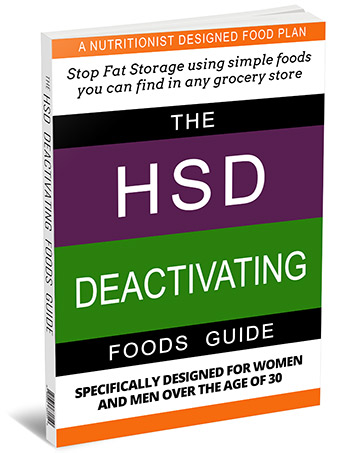
Plus, When You Take Action Today, You Also Get This Special FREE Bonus ($99 value)
The HSD Deactivating Foods Guide
This is a nutritionist designed food plan for turning off your bodies fat storing HSD enzyme. This easy-to-follow plan will help you shut down your bodies fat storing enzyme as early as tonight using simple foods you can find at any grocery store.
The HSD Deactivating Foods Guide has a normal retail price of $99 but today you can get it for free with your order.
DEACTIVATE is a natural proprietary blend of plant extracts from Magnolia officinalis and Rhodiola rosea that is non habit-forming.
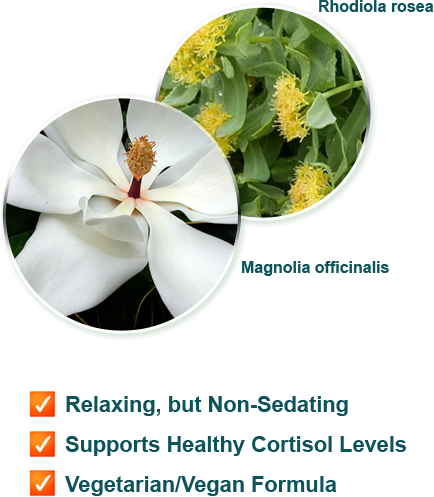
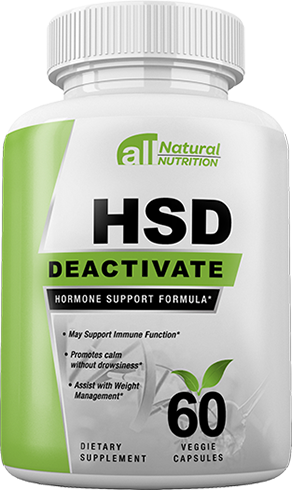

Choose Your Option Below:
(Special New Customer Introductory Pricing)

Plus, When You Take Action Today, You Also Get This Special FREE Bonus ($99 value)
The HSD Deactivating Foods Guide
This is a nutritionist designed food plan for turning off your bodies fat storing HSD enzyme. This easy-to-follow plan will help you shut down your bodies fat storing enzyme as early as tonight using simple foods you can find at any grocery store.
The HSD Deactivating Foods Guide has a normal retail price of $99 but today you can get it for free with your order.
References:
1. https://jissn.biomedcentral.com/articles/10.1186/1550-2783-10-37
2. Epel, E. Proceedings of the National Academy of Sciences, Nov. 29-Dec. 4, 2004.
3. Leverenz1, J., Wilkinson, C., Wamble1, M., Corbin, S., Grabber, JE., Raskind, M., Peskind, E. Effect of Chronic High-Dose Exogenous Cortisol on Hippocampal Neuronal Number in Aged Nonhuman Primates. The Journal of Neuroscience, March 15, 1999, 19(6):2356-2361.
4. Lupien SJ, Fiocco A, Wan N, Maheu F, Lord C, Schramek T, Tu MT. Stress hormones and human memory function across the lifespan. Psychoneuroendocrinology. 2005 Apr;30(3):225-42.
5. Kuribara H, Kishi E, Hattori N, Okada M, Maruyama Y. The anxiolytic effect of two oriental herbal drugs in Japan attributed to honokiol from magnolia bark. J Pharm Pharmacol 2000 Nov;52(11):1425-9.
6. Maruyama Y, Kuribara H, Morita M, Yuzurihara M, Weintraub ST. Identification of magnolol and honokiol as anxiolytic agents in extracts of saiboku-to, an oriental herbal medicine. J Nat Prod 1998 Jan;61(1):135-8.
7. Nakazawa T, Yasuda T, Ohsawa K. Metabolites of orally administered Magnolia officinalis extract in rats and man and its antidepressant-like effects in mice. J Pharm Pharmacol. 2003 Nov; 55(11): 1583-91.
8. Kuribara H, Stavinoha WB, Maruyama Y. Behavioural pharmacological characteristics of honokiol, an anxiolytic agent present in extracts of Magnolia bark, evaluated by an elevated plus-maze test in mice. J Pharm Pharmacol 1998 Jul;50(7):819-26.
9. Hou YC, Chao PD, Chen SY. Honokiol and magnolol increased hippocampal acetylcholine release in freely-moving rats. Am J Chin Med 2000;28(3-4):379-84.
10. Liu B, Hattori N, Zhang NY, Wu B, Yang L, Kitagawa K, Xiong ZM, Irie T, Inagaki C. Anxiolytic agent, dihydrohonokiol-B, recovers amyloid beta protein-induced neurotoxicity in cultured rat hippocampal neurons. Neurosci Lett. 2005 Aug 12-19;384(1-2):44-7.
11. Fukuyama Y, Nakade K, Minoshima Y, Yokoyama R, Zhai H, Mitsumoto Y. Neurotrophic activity of honokiol on the cultures of fetal rat cortical neurons. Bioorg Med Chem Lett 2002 Apr 22;12(8):1163-6.
12. Lo YC, Teng CM, Chen CF, Chen CC, Hong CY. Magnolol and honokiol isolated from Magnolia officinalis protect rat heart mitochondria against lipid peroxidation. Biochem Pharmacol 1994 Feb 9;47(3):549-53.
13. Chiu JH, Ho CT, Wei YH, Lui WY, Hong CY. In vitro and in vivo protective effect of honokiol on rat liver from peroxidative injury. Life Sci 1997;61(19):1961-71.
14. Chiu JH, Wang JC, Lui WY, Wu CW, Hong CY. Effect of magnolol on in vitro mitochondrial lipid peroxidation and isolated cold-preserved warm-reperfused rat livers. J Surg Res 1999 Mar;82(1):11-6.
15. Shen YC, Sung YJ, Chen CF. Magnolol inhibits Mac-1 (CD11b/CD18)-dependent neutrophil adhesion: relationship with its antioxidant effect. Eur J Pharmacol 1998 Feb 5;343(1):79-86.
16. Lee MM, Hseih MT, Kuo JS, Yeh FT, Huang HM. Magnolol protects cortical neuronal cells from chemical hypoxia in rats.Neuroreport 1998 Oct 26;9(15):3451-6.
17. Kong CW, Tsai K, Chin JH, Chan WL, Hong CY. Magnolol attenuates peroxidative damage and improves survival of rats with sepsis. Shock 2000 Jan;13(1):24-8.
18. Zhong WB, Wang CY, Ho KJ, Lu FJ, Chang TC, Lee WS. Magnolol induces apoptosis in human leukemia cells via cytochrome c release and caspase activation. Anticancer Drugs 2003 Mar;14(3):211-7.
19. Ikeda K, Nagase H. Magnolol has the ability to induce apoptosis in tumor cells. Biol Pharm Bull 2002 Dec;25(12):1546-9.
20. Lin SY, Liu JD, Chang HC, Yeh SD, Lin CH, Lee WS. Magnolol suppresses proliferation of cultured human colon and liver cancer cells by inhibiting DNA synthesis and activating apoptosis. J Cell Biochem2002;84(3):532-44.
21. Lin SY, Chang YT, Liu JD, Yu CH, Ho YS, Lee YH, Lee WS. Molecular mechanisms of apoptosis induced by magnolol in colon and liver cancer cells. Mol Carcinog 2001
22. Wang T, Chen F, Chen Z, Wu YF, Xu XL, Zheng S, Hu X. Honokiol induces apoptosis through p53-independent pathway in human colorectal cell line RKO. World J Gastroenterol. 2004 Aug 1;10(15):2205-8.
23. Sciencedaily.com. "Emory scientists find anti-tumor compounds in magnolia cones."
24. Wang SM, et al., Magnolol stimulates steroidogenesis in rat adrenal cells, British Journal of Pharmacology 2000; 131(6): 1172-1178.
25. Zhu YP, Chinese Materia Medica: Chemistry, Pharmacology, and Applications, 1998 Harwood Academic Publishers, Amsterdam.
26. Bang KH, et al., Antifungal activity of magnolol and honokiol,Archives Pharmaceutical Research 2000; 23(1): 46-49.
27. Wang JP, et al., Anti-inflammatory and analgesic effects of magnolol,Archives Pharmacology 1992; 346(6): 707-712.
28. Homma M, Oka K, Kobayashi H, Niitsuma T, Yamamoto S, Itoh H, Takahashi N. Impact of free magnolol excretions in asthmatic patients who responded well to saiboku-to, a Chinese herbal medicine. J Pharm Pharmacol 1993 Sep;45(9):844-6.
29. Wu SN, Chen CC, Li HF, Lo YK, Chen SA, Chiang HT. Stimulation of the BK(Ca) channel in cultured smooth muscle cells of human trachea by magnolol. Thorax 2002 Jan;57(1):67-74.
